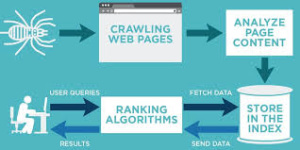How Search Engines Work: Search Engine Concepts for SEO Beginners
- September 14, 2020
- Advanced SEO Techniques, Online marketing, SEO

Everybody has head of search engines and what purpose they are built for; search engines mean a lot more for SEO professionals and digital marketers who have to rank their websites on the search engine results page. From crawling to indexing and page rank, successful digital marketing begins with thorough understanding of search of major search engines and how they work. When people enter a search query into a search engine bar, all the relevant pages that a search engine deems relevant are piled up into single results and displayed on the SERP page. A search engine works with algorithm that ranks relevant pages into a set of results. Let us help you learn how search engines work when you read this insightful post.
How Search Engines Function?
Every new SEO beginner starts his learning by getting to know the basics of search engines and how they can learn as much about them. A Search Engine Journal SEJ author Dave Davies writes in his recent post that search engines crawl hundreds of billions of pages using special web crawlers. Professionals usually call these crawlers the search engine bots or spiders. When a search engine navigates the huge world wide web of the Internet, it uses it swab crawlers and downloads the related web pages and the links on these pages to discover new pages.
That brings us to a vital concept related to search engines. What is Search Engine Index?
The Search Engine Index

An index is a generic name for a database that holds some structured data; the search engines discover billions of web pages and add their data into the structured database or repository called index. The index has a function that discovers all the URLs and the number of vital signals about the contents of each URL. For example, the following things are stored in the search engine index:
- The keywords discovered by the search engine with the page content.
- The type of topics a web page covers.
- The type of content on the web page that a search engines crawls and what is included in the content.
- The freshness of the web page and when the web page was last updated.
- When was the page previously used by a user or engagement history?
- The domain name and how do people engage with that domain.
The Goal of Search Engine Algorithm
As a beginner SEO, you must have heard that all the work done by a search engine is strategically planned and performed by an algorithm at the back-end. The purpose of a search engine algorithm is to present a high quality search result for the users of search engine. The search engine algorithm helps the users to search for a specific query or get the answered to their queries when they type a keyword phrase; the algorithm ensures that the search engine brings those results as quickly as possible. The users are able to select the relevant option from the list of results and the algorithm performs the next actions as described in its functioning. Therefore, the algorithm helps the search engines to teach more abbots the future searches and bring the right results to the users that improve the website rankings.
When Happens when a Search is Performed

When a search engine receives a query from a user on Google or Bing, the users get all the pages that are deemed relevant by the search engines. The search engine identifies those pages from the index and an algorithm is used to hierarchically rank the relevant pages into a set of results. The algorithm is also used to rank the most relevant results that are not the same in all the search engines. For example, when Google brings some search results to the users that does not mean that Yahoo or Bing will also produce the same results when entered a search query.
On top of that, the search engines also perform other functions in addition to search query. The search engines collect and use the other type of data from users to return the most relevant results in the future including:
- Location of the users. For instance, if a user search by a keyword “movie halls near me”, then the search engine like Google can save its location and use that location for future search results in their area.
- Language detected by the search deigns is important to offer the language-specific results to the users. The search engines are intelligent to return results in the languages that user’s type.
- The previous search history also matters for the search engines; each search engine can return different results for a query dependent on what user has previously searched for.
- The device user uses for searching for his products or problems. For example, for each different device or gadget used by the user, a set of different results is obtained by the users from which the query was made.
Why a Page Might not Enter into the Index
Another important thing for SEO professionals to know is why a web page might not become a part of the search engine index? There could be can of reasons for that according to the circumstances that determine how the search engines treat a webpage. A URL is often not indexed when:
- txt file is strictly prohibiting the search engines what they should visit on your site.
- Directives on the web page that also tell the search engines not to index that page.
- Search engines algorithms that judge the page to be of low quality in terms of content.
- The URL is not functioning correctly and returns 404 errors when accessed on the web.
What is Crawling, Indexing, and Ranking?

Search engines scour the internet for the relevant content whether it is text or video or info graphics. Looking over the code, the crawler is strategically designed for identifying each URL on the internet. Moreover, an index as discussed above helps the search engine to successfully store and organize the content found during the crawling process. A web page is entered into the index and it is in the running to be displayed as a result for different user search queries. The rank offers the piece of content allow users to find the best possible solution for their problem or search query; this means that the results are ordered by most relevant to least relevant keywords.
The crawling process is important for SEO marketers to understand because it helps to know how a search engine sends a team of robots called spiders to find a new updated content. The content can differ widely due to so many different types of information’s on the Internet including a text, video, or image. However, a spider always discovers content via its link regardless of its type. Moreover, when anyone performs a search on the web, the most relevant content is being searched by the search engine and then it orders the content to solve the query of the user. This ordering of search results is known as ranking.
The Final Word
Now that you know the basics of crawling, indexing, ranking, and how search engines algorithms work, keep in mind that all search engines are not equal when it comes to performing successful search engine optimization strategy SEO. Many beginners can wonder about the relative differences between Google and other popular search engines. However, Google remains the highest market share owner that demands the attention of all the SEO professionals around the world. Therefore, learning Google SEO essentials can help you master the game of SEO in the presence of 30 major search engines.
www.seo.ae is an expert for everything related to search engines. Our professional Search Engine Optimization service boosts your website organically in Google widening visibility and business lead generation. We also provide quality Social Media Marketing service for all online brands and businesses.
About us and this blog
We are a digital marketing company with a focus on helping our customers achieve great results across several key areas.
Request a free quote
We offer professional SEO services that help websites increase their organic search score drastically in order to compete for the highest rankings even when it comes to highly competitive keywords.
Subscribe to our newsletter!
Recent Posts
- How to Track Customers and Revenue from SEO in Your CRM? May 1, 2023
- How Could You Block ChatGPT from Using Content of Your Website? March 14, 2023
- How to Make Your Professional Website Mobile Friendly? February 1, 2023








